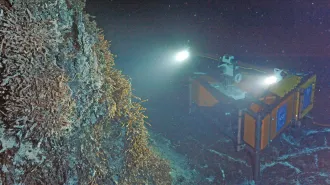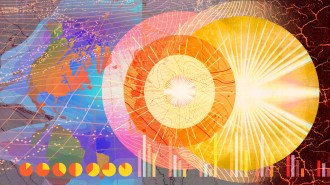From San Diego, at the Experimental Biology 2003 meeting
Babies whose moms smoke during pregnancy are five times as likely to die from sudden infant death syndrome (SIDS) than are nonsmokers’ infants, notes Ralph E. Fregosi of Arizona State University in Tucson. In studies with rodents, he and Zili Luo have now identified a possible explanation: Nicotine exposure in the womb may slow or even stop the firing of respiratory nerves that trigger breaths.
Earlier studies linked nicotine to SIDS (SN: 9/14/02, p. 163: Available to subscribers at Smoking Gun? Mouse tests link nicotine to crib death). To explore what the stimulant might be doing, the researchers implanted tiny pumps under the skin of female rats on the third day of their 3-week pregnancies. The pumps delivered either saline or nicotine–the latter, in amounts that yielded blood concentrations comparable to those in people who smoke two packs of cigarettes per day.
As each pup was born, the researchers removed the animal’s brainstem and spinal cord and kept that tissue alive for 3 days. The nerves continued to fire signals that would normally trigger a newborn rat’s diaphragm to contract, thereby initiating breaths. Luo recorded these signals before and after administering a drug that mimics gamma-aminobutyric acid (GABA), a natural brain chemical that keeps nerves from overfiring.
In the tissue from pups that had received saline, the drug blunted the breathing system slightly. In the tissue from nicotine-exposed newborns, neural activity dropped by 20 to 30 percent with the drug. In some instances, the breathing signals ceased.
Fregosi and Luo then counted the sites on brain cells where GABA would typically attach. The brainstems from nicotine-exposed pups had far more of these GABA receptors than the tissue from saline-exposed rats did. The researchers are now studying how long the prenatal nicotine renders nerves oversensitive to GABA.
****************
If you have a comment on this article that you would like considered for publication in Science News, send it to editors@sciencenews.org. Please include your name and location.







